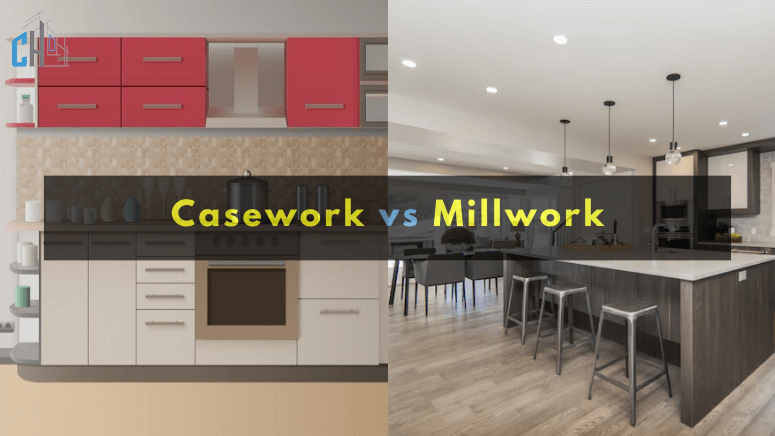Explore the key differences between casework and millwork in this comprehensive guide. Learn to choose the right custom woodwork for your 2025 project.
Knowing the difference between casework and millwork is decisive for both architects, designers, and homeowners when choosing materials for the construction or remodeling project.
The casework is a kind of the ready-made or pre-assembled cabinetry that is created for easy fixing and unconditional application. It is almost a universal appliance found in bedrooms, kitchens, bathrooms and other storage areas. On the other hand, millwork covers the built-in designs that are customized to meet the unique requirements of a certain area.
This encompasses unique cabinetry, moldings, and architectural details, making handcrafted furniture a perfect option which may not be available with vanities. In this case, the decision between the two can be a dilemma because they either have a unique advantage or call for a good consideration before it is made.
The core of space design is mostly often it’s fine tuning. The solving of the architectural casework riddle and millwork is crucial for the project mapping by the interested workers that have got an eye for detailing.
Architects, interior designers and even homeowners come across these phrases day in and day out, but how many actually know what they mean? This analysis not only for the professionals involved with the designing but also for the end-users who use the structures for their daily basis.
Casework Overview
Casework, which is an architectural jargon, is a built-in framing structure that goes within spaces. This entails for instance the built-in ones close to the window, the headboard against the wall, and the drawers under the bed.
Casework can be seen in the modern and contemporary minimalist designs which adhere to aesthetic conciseness and functionality. Constructed along a prefabricated and factory-built manner, each item aims to fit into the integrated fabric of the building as a whole.
Key Characteristics of Casework: Recognizing the Dominating Components
Casework embodies a few key features that distinguish it from other architectural elements:
Modular Construction: It’s assembled in the same way according to the unit sizes and completed pieces can be put together into different modules on site.
Utilitarian Design: Nature abides by the rule of utility. Casework in belongings is synonymous with the objective, purposeful, and thus simplistic strengthening of the infrastructures.
Flexibility: This furniture has the ability to be pulled apart and set up in a different location where the arrangement is needed in the future, thereby avoiding wastage or contributing towards a more sustainable alternative.
Pros and Cons of Casework
Casework is not without its limitations, but its benefits often outweigh its drawbacks:
Advantages of Casework
Precision: This type of construction offers the ability to deliver high precision and quality control in controlled conditions at off-site scenarios.
Faster Installation: Since prefabrication is utilized, installation of the casework could be done quickly, thereby, abridging the process of construction on the scenes.
Disadvantages of Casework
Limited Design Flexibility: One of the constraints of the modular units that it may not be suitable for areas that are not rectangular or as traditionally expected.
Cost Considerations: The per unit cost of casework may often be higher, and shrink catalog by custom design.
Mastering the Millwork
On the contrary, the millwork is about craft and customisation which is the exact opposite of prefabricated and modular commonplace of casework. The personalized nature of millwork separates it from the mainstream. In the days of the industrial revolution, items at millwork (an old word derived from “mill”) means that things were created in a mill, such as molding wood or cabinetry that was designed and installed to suit a specific spot.
The casework incorporates modernity while the cabinetry renders the past sense, featuring the traditional craftsmanship with natural wood looking strikingly beautiful. It is an amazingly decorated trade that one can choose to give the space a significant dash of sophistication and high class.
The Art of Millwork
Key characteristics of millwork include:
Custom Craftsmanship: Everyone knows that every part is different and that it is models with all necessary and precise information.
Aesthetic Additions: Aesthetic features are another small part of millwork, where they supply additional details in diverse textures that help in improving the visual appeal of the space.
Integral Part of the Whole: In this fashion, millwork frequently becomes a room focal point and is often crafted for blending harmoniously with the architectural features of the space.
Pros and Cons of Millwork
Millwork stands as a testament to the artful craftsmanship of woodworking, yet it also comes with its own set of considerations:
Advantages of Millwork
Aesthetic Appeal: Its new and personal taste ensures clear, gorgeous, and unique design that can redesign the space to its own character.
Fit and Finish: Each of the pieces is positioned carefully to suit countless irregular shapes, so the result turns out like everything was created to fill those spots only.
Disadvantages of Millwork
Time-Intensive: Clients can expect the millwork to be custom-made which will require time, thus they may need to be patient in regards to the installation of the same.
Potential for Cost Overruns: With custom millwork comes added labor, which means higher costs like when there are design changes or unexpected scratch during the construction.
Also read: The Ultimate Guide to Millwork Shop Drawings
Key Differences: Exploring Variances for Better Understanding
At first sight, casework and millwork may seem similar, whereas in fact they are used for different purposes and offer different design elements.
Casework, therefore, focuses on functionality and expediency. It stands for the backbone of modern furniture, which produces high-grade storage and organization systems.
While the former is mass produced, the latter is a bespoke art, which emphasizes elegance and individuality. It may be the personalized detail that gives a room its character and feeling of being home.
When and Why to Pick
In casework and millwork the choice between the need and design goal always goes as to a project determining properly.
Choosing Casework
When should you prefer parity work instead of full mill work? Casework might be the better choice if you:
- Require a modular design that can adapt to changing needs.
- Seek a more cost-effective, yet high-quality solution for storage and display.
- Value quicker lead times and installation schedules.
Choosing Millwork
Millwork may be the ideal choice for those who:
- Desire a completely custom and unique look for their space.
- Aim to create an upscale, luxurious environment with fine architectural details.
- Are comfortable with a longer timeline and a potentially higher budget for the added value of bespoke craftsmanship.
The Right Fit for Your Project
Architects, interior designers, and clients have to weigh goals, budget and timeframe while choosing between the custom-made products for their projects, or the products ready made in the factory. The reality is that each has a distinctive portion of pros to offer, and the correct course of action to take becomes evident after comprehending the nature of each one of them.
If you have been thinking of putting in case work or mill work for your next project, you have to rely on trusted partners who are experts in this field with proven supplies and installations. It can be either cabinetry work combined with millwork artistry that showcases both the modular nature of casework as well as the stand alone presence of custom work, or it can be totally custom mill work that only a true expert in custom millwork can deliver.
Choosing the Best Partner for Architectural Millwork Services
To stand out in the architectural projects among other appealing and attractive projects, the most critical aspect before you is that is to choose the right millwork partner.
Chudasama Outsourcing operation revolves around the architectural mill work but beyond crafting the vision, but clearly understand it is an extension of our client’s vision. Latest own care and creative energy, we make specific that every individual item of millwork we build is not simply a part of the structure, but a piece of art that adds more to the complete aesthetic as well as functionality feature of the position.
Why Choose CAD Drafting Company?
We do know architectural millwork services that there are a lot of small requirements of architects to be fulfilled. Our company, which is staffed with competent experts, is dedicated to producing 3D millwork shop drawings of remarkable detail to ensure that the finished item is merely visually appealing but one that communicates seamlessly with the surrounding environment.
The CAD drawings we make for all millworks are made with high quality and precision as a proof of our professional comprehension. Particularly, if you choose our company for your millwork drawing needs, you will have an extra assurance that the production rate and quality won’t be disappointed with your architectural designs in reality.
In conclusion,
Casework VS Millwork in choosing the right custom woodwork for your projects. Both millwork and casework are capable of adding functional value to the project, but they require different approaches in order to achieve the best results.
Millwork emphasizes crafting skills and spectacular details, while casework offers more economical alternatives in packaged solutions. Whether to choose sustainable, organic, or synthetic fashion products depends on factors like budget, time limitation, and the needed level of modification. Finally, it’s the end of the day, which means finding the perfect form between design, functionality, and money to come up with a stunning and fit space.




